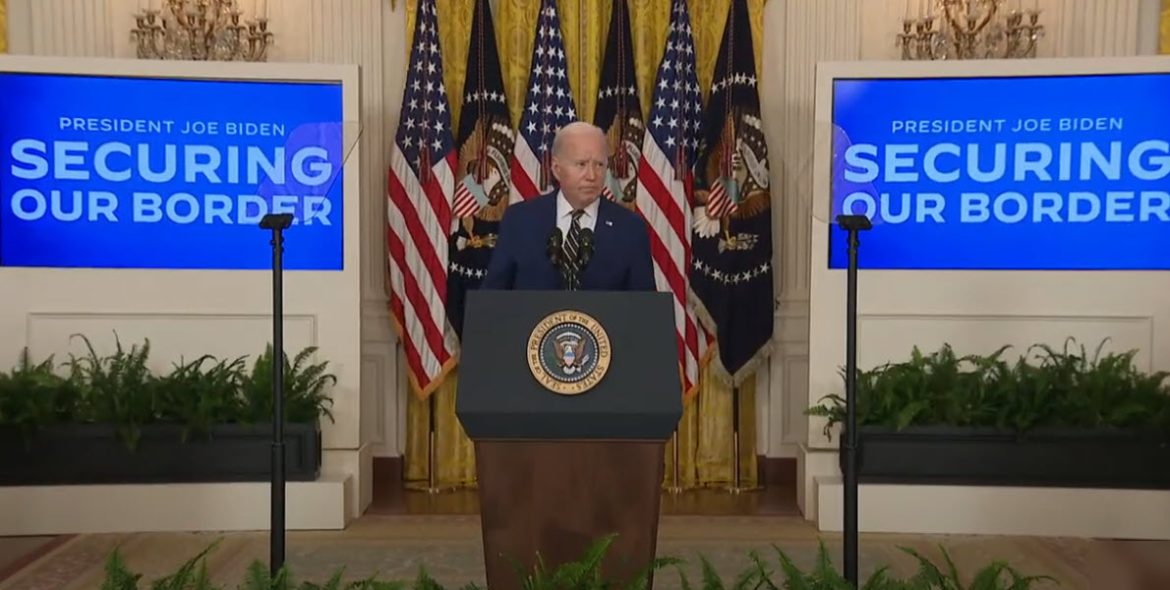President Biden signs an executive order aimed at reducing the flow of migrant crossings at the U.S.-Mexico border amid mounting political pressure. The order prohibits migrants who cross the border illegally from applying for asylum once the number of daily encounters exceeds 2,500 between official ports of entry.
In his remarks from the White House, President Biden explains that the decision follows the collapse of a bipartisan border bill earlier this year. He emphasizes that the executive action is necessary to manage the surging number of border crossings and to ensure immigration officers can swiftly remove individuals without a legal basis to remain in the U.S. The order does not affect migrants who present themselves lawfully for asylum at official ports of entry.
The White House states that the new policy will streamline the process for immigration officers, making it easier to deport those who do not meet the criteria for staying in the country. This action comes as polling indicates that most Americans disapprove of Biden’s handling of immigration issues, particularly as border crossings continue to rise.
House Republicans criticize the executive order, calling it insufficient to address the broader migrant crisis. Speaker Mike Johnson refers to the action as “window dressing” and urges the President to take more comprehensive measures, such as reforming the parole process, reinstating the “remain in Mexico” policy, and ending catch and release practices. Johnson asserts that a single executive order cannot solve the complex issues at the border.
Senator Ted Cruz of Texas also criticizes the timing of the executive order, labeling it as election-year politicking. Cruz argues that the policy might encourage more illegal immigration rather than curb it. He points to the over five million illegal immigrants currently living in the U.S. who crossed the Southwest border during Biden’s presidency, asserting that more robust measures are needed to tackle the issue.
On the other hand, Democratic Senator Mark Kelly of Arizona defends the President’s action, blaming Republican inaction for forcing Biden’s hand. Kelly highlights that the GOP blocked a bill that could have addressed the crisis, leaving the President with limited options.
The executive order comes as New York City grapples with its own migrant crisis. Since spring 2022, nearly 200,000 migrants have arrived in the city, straining local resources. The influx has led to significant budget cuts, with reports indicating that one in every five hotels in the city now serves as a migrant shelter. A recent incident involving a Venezuelan migrant allegedly shooting two NYPD officers has further heightened tensions and underscored the urgency of addressing the migrant situation.
Attorney General Merrick Garland faces tough questions from House Republicans during a congressional hearing. GOP lawmakers press Garland to release audio tapes of President Biden’s interview with the DOJ regarding his handling of classified material. Special Counsel Robert Hur previously decided not to prosecute Biden, citing potential jury sympathy due to Biden’s age and memory issues. This decision has sparked a political firestorm, with Republicans accusing the DOJ of a double standard in its treatment of Trump versus Biden.
Garland defends the DOJ’s actions, denying claims of weaponization and emphasizing the department’s independence and adherence to the law. He also pushes back against GOP threats to hold him in contempt of Congress for refusing to release the Biden tapes, citing concerns over potential AI-generated fakes.
President Biden’s executive order marks a significant step in addressing the migrant crisis at the U.S.-Mexico border. While it faces criticism and potential legal challenges, the administration hopes it will help manage the situation more effectively. As the political landscape evolves, the executive action is likely to remain a contentious issue, influencing the broader debate on immigration reform.



